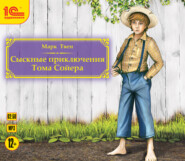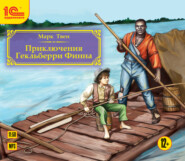По всем вопросам обращайтесь на: info@litportal.ru
(©) 2003-2025.
✖
A Tramp Abroad
Автор
Год написания книги
2015
Настройки чтения
Размер шрифта
Высота строк
Поля
Paris, 27; Glasgow, 27; London, 28; Vienna, 28; Augsburg, 28; Braunschweig, 28; Königsberg, 29; Cologne, 29; Dresden, 29; Hamburg, 29; Berlin, 30; Bombay, 30; Warsaw, 31; Breslau, 31; Odessa, 32; Munich, 33; Strasburg, 33, Pesth, 35; Cassel, 35; Lisbon, 36; Liverpool, 36; Prague, 37; Madras, 37; Bucharest, 39; St. Petersburg, 40; Trieste, 40; Alexandria (Egypt), 43; Dublin, 48; Calcutta, 55.
Edinburgh is as healthy as New York—23; but there is no city in the entire list which is healthier, except Frankfort-on-the-Main—20. But Frankfort is not as healthy as Chicago, San Francisco, St. Louis, or Philadelphia.
Perhaps a strict average of the world might develop the fact that where one in 1,000 of America’s population dies, two in 1,000 of the other populations of the earth succumb.
I do not like to make insinuations, but I do think the above statistics darkly suggest that these people over here drink this detestable water “on the sly.”
We climbed the moraine on the opposite side of the glacier, and then crept along its sharp ridge a hundred yards or so, in pretty constant danger of a tumble to the glacier below. The fall would have been only one hundred feet, but it would have closed me out as effectually as one thousand, therefore I respected the distance accordingly, and was glad when the trip was done. A moraine is an ugly thing to assault head-first. At a distance it looks like an endless grave of fine sand, accurately shaped and nicely smoothed; but close by, it is found to be made mainly of rough boulders of all sizes, from that of a man’s head to that of a cottage.
By and by we came to the Mauvais Pas, or the Villainous Road, to translate it feelingly. It was a breakneck path around the face of a precipice forty or fifty feet high, and nothing to hang on to but some iron railings. I got along, slowly, safely, and uncomfortably, and finally reached the middle. My hopes began to rise a little, but they were quickly blighted; for there I met a hog – a long-nosed, bristly fellow, that held up his snout and worked his nostrils at me inquiringly. A hog on a pleasure excursion in Switzerland – think of it! It is striking and unusual; a body might write a poem about it. He could not retreat, if he had been disposed to do it. It would have been foolish to stand upon our dignity in a place where there was hardly room to stand upon our feet, so we did nothing of the sort. There were twenty or thirty ladies and gentlemen behind us; we all turned about and went back, and the hog followed behind. The creature did not seem set up by what he had done; he had probably done it before.
We reached the restaurant on the height called the Chapeau at four in the afternoon. It was a memento-factory, and the stock was large, cheap, and varied. I bought the usual paper-cutter to remember the place by, and had Mont Blanc, the Mauvais Pas, and the rest of the region branded on my alpen-stock; then we descended to the valley and walked home without being tied together. This was not dangerous, for the valley was five miles wide, and quite level.
We reached the hotel before nine o’clock. Next morning we left for Geneva on top of the diligence, under shelter of a gay awning. If I remember rightly, there were more than twenty people up there. It was so high that the ascent was made by ladder. The huge vehicle was full everywhere, inside and out. Five other diligences left at the same time, all full. We had engaged our seats two days beforehand, to make sure, and paid the regulation price, five dollars each; but the rest of the company were wiser; they had trusted Baedeker, and waited; consequently some of them got their seats for one or two dollars. Baedeker knows all about hotels, railway and diligence companies, and speaks his mind freely. He is a trustworthy friend of the traveler.
We never saw Mont Blanc at his best until we were many miles away; then he lifted his majestic proportions high into the heavens, all white and cold and solemn, and made the rest of the world seem little and plebeian, and cheap and trivial.
As he passed out of sight at last, an old Englishman settled himself in his seat and said:
“Well, I am satisfied, I have seen the principal features of Swiss scenery – Mont Blanc and the goiter – now for home!”
Chapter XLVII
We spent a few pleasant restful days at Geneva, that delightful city where accurate time-pieces are made for all the rest of the world, but whose own clocks never give the correct time of day by any accident.
Geneva is filled with pretty shops, and the shops are filled with the most enticing gimcrackery, but if one enters one of these places he is at once pounced upon, and followed up, and so persecuted to buy this, that, and the other thing, that he is very grateful to get out again, and is not at all apt to repeat his experiment. The shopkeepers of the smaller sort, in Geneva, are as troublesome and persistent as are the salesmen of that monster hive in Paris, the Grands Magasins du Louvre – an establishment where ill-mannered pestering, pursuing, and insistence have been reduced to a science.
In Geneva, prices in the smaller shops are very elastic – that is another bad feature. I was looking in at a window at a very pretty string of beads, suitable for a child. I was only admiring them; I had no use for them; I hardly ever wear beads. The shopwoman came out and offered them to me for thirty-five francs. I said it was cheap, but I did not need them.
“Ah, but monsieur, they are so beautiful!”
I confessed it, but said they were not suitable for one of my age and simplicity of character. She darted in and brought them out and tried to force them into my hands, saying:
“Ah, but only see how lovely they are! Surely monsieur will take them; monsieur shall have them for thirty francs. There, I have said it – it is a loss, but one must live.”
I dropped my hands, and tried to move her to respect my unprotected situation. But no, she dangled the beads in the sun before my face, exclaiming, “Ah, monsieur cannot resist them!” She hung them on my coat button, folded her hand resignedly, and said: “Gone, – and for thirty francs, the lovely things – it is incredible! – but the good God will sanctify the sacrifice to me.”
I removed them gently, returned them, and walked away, shaking my head and smiling a smile of silly embarrassment while the passers-by halted to observe. The woman leaned out of her door, shook the beads, and screamed after me:
“Monsieur shall have them for twenty-eight!”
I shook my head.
“Twenty-seven! It is a cruel loss, it is ruin – but take them, only take them.”
I still retreated, still wagging my head.
“Mon dieu, they shall even go for twenty-six! There, I have said it. Come!”
I wagged another negative. A nurse and a little English girl had been near me, and were following me, now. The shopwoman ran to the nurse, thrust the beads into her hands, and said:
“Monsieur shall have them for twenty-five! Take them to the hotel – he shall send me the money tomorrow – next day – when he likes.” Then to the child: “When thy father sends me the money, come thou also, my angel, and thou shall have something oh so pretty!”
I was thus providentially saved. The nurse refused the beads squarely and firmly, and that ended the matter.
The “sights” of Geneva are not numerous. I made one attempt to hunt up the houses once inhabited by those two disagreeable people, Rousseau and Calvin, but I had no success. Then I concluded to go home. I found it was easier to propose to do that than to do it; for that town is a bewildering place. I got lost in a tangle of narrow and crooked streets, and stayed lost for an hour or two. Finally I found a street which looked somewhat familiar, and said to myself, “Now I am at home, I judge.” But I was wrong; this was “Hell street.” Presently I found another place which had a familiar look, and said to myself, “Now I am at home, sure.” It was another error. This was “Purgatory street.” After a little I said, “Now I’ve got the right place, anyway… no, this is ‘paradise street’; I’m further from home than I was in the beginning.” Those were queer names – Calvin was the author of them, likely. “Hell” and “Purgatory” fitted those two streets like a glove, but the “Paradise” appeared to be sarcastic.
I came out on the lake-front, at last, and then I knew where I was. I was walking along before the glittering jewelry shops when I saw a curious performance. A lady passed by, and a trim dandy lounged across the walk in such an apparently carefully timed way as to bring himself exactly in front of her when she got to him; he made no offer to step out of the way; he did not apologize; he did not even notice her. She had to stop still and let him lounge by. I wondered if he had done that piece of brutality purposely. He strolled to a chair and seated himself at a small table; two or three other males were sitting at similar tables sipping sweetened water. I waited; presently a youth came by, and this fellow got up and served him the same trick. Still, it did not seem possible that any one could do such a thing deliberately. To satisfy my curiosity I went around the block, and, sure enough, as I approached, at a good round speed, he got up and lounged lazily across my path, fouling my course exactly at the right moment to receive all my weight. This proved that his previous performances had not been accidental, but intentional.
I saw that dandy’s curious game played afterward, in Paris, but not for amusement; not with a motive of any sort, indeed, but simply from a selfish indifference to other people’s comfort and rights. One does not see it as frequently in Paris as he might expect to, for there the law says, in effect, “It is the business of the weak to get out of the way of the strong.” We fine a cabman if he runs over a citizen; Paris fines the citizen for being run over. At least so everybody says – but I saw something which caused me to doubt; I saw a horseman run over an old woman one day – the police arrested him and took him away. That looked as if they meant to punish him.
It will not do for me to find merit in American manners – for are they not the standing butt for the jests of critical and polished Europe? Still, I must venture to claim one little matter of superiority in our manners; a lady may traverse our streets all day, going and coming as she chooses, and she will never be molested by any man; but if a lady, unattended, walks abroad in the streets of London, even at noonday, she will be pretty likely to be accosted and insulted – and not by drunken sailors, but by men who carry the look and wear the dress of gentlemen. It is maintained that these people are not gentlemen, but are a lower sort, disguised as gentlemen. The case of Colonel Valentine Baker obstructs that argument, for a man cannot become an officer in the British army except he hold the rank of gentleman. This person, finding himself alone in a railway compartment with an unprotected girl – but it is an atrocious story, and doubtless the reader remembers it well enough. London must have been more or less accustomed to Bakers, and the ways of Bakers, else London would have been offended and excited. Baker was “imprisoned”—in a parlor; and he could not have been more visited, or more overwhelmed with attentions, if he had committed six murders and then – while the gallows was preparing—“got religion”—after the manner of the holy Charles Peace, of saintly memory. Arkansaw – it seems a little indelicate to be trumpeting forth our own superiorities, and comparisons are always odious, but still – Arkansaw would certainly have hanged Baker. I do not say she would have tried him first, but she would have hanged him, anyway.
Even the most degraded woman can walk our streets unmolested, her sex and her weakness being her sufficient protection. She will encounter less polish than she would in the old world, but she will run across enough humanity to make up for it.
The music of a donkey awoke us early in the morning, and we rose up and made ready for a pretty formidable walk – to Italy; but the road was so level that we took the train.. We lost a good deal of time by this, but it was no matter, we were not in a hurry. We were four hours going to Chambèry. The Swiss trains go upward of three miles an hour, in places, but they are quite safe.
That aged French town of Chambèry was as quaint and crooked as Heilbronn. A drowsy reposeful quiet reigned in the back streets which made strolling through them very pleasant, barring the almost unbearable heat of the sun. In one of these streets, which was eight feet wide, gracefully curved, and built up with small antiquated houses, I saw three fat hogs lying asleep, and a boy (also asleep) taking care of them.
From queer old-fashioned windows along the curve projected boxes of bright flowers, and over the edge of one of these boxes hung the head and shoulders of a cat – asleep. The five sleeping creatures were the only living things visible in that street. There was not a sound; absolute stillness prevailed. It was Sunday; one is not used to such dreamy Sundays on the continent. In our part of the town it was different that night. A regiment of brown and battered soldiers had arrived home from Algiers, and I judged they got thirsty on the way. They sang and drank till dawn, in the pleasant open air.
We left for Turin at ten the next morning by a railway which was profusely decorated with tunnels. We forgot to take a lantern along, consequently we missed all the scenery. Our compartment was full. A ponderous tow-headed Swiss woman, who put on many fine-lady airs, but was evidently more used to washing linen than wearing it, sat in a corner seat and put her legs across into the opposite one, propping them intermediately with her up-ended valise. In the seat thus pirated, sat two Americans, greatly incommoded by that woman’s majestic coffin-clad feet. One of them begged, politely, to remove them. She opened her wide eyes and gave him a stare, but answered nothing. By and by he proferred his request again, with great respectfulness. She said, in good English, and in a deeply offended tone, that she had paid her passage and was not going to be bullied out of her “rights” by ill-bred foreigners, even if she was alone and unprotected.
“But I have rights, also, madam. My ticket entitles me to a seat, but you are occupying half of it.”
“I will not talk with you, sir. What right have you to speak to me? I do not know you. One would know you came from a land where there are no gentlemen. No gentleman would treat a lady as you have treated me.”
“I come from a region where a lady would hardly give me the same provocation.”
“You have insulted me, sir! You have intimated that I am not a lady – and I hope I am not one, after the pattern of your country.”
“I beg that you will give yourself no alarm on that head, madam; but at the same time I must insist – always respectfully – that you let me have my seat.”
Here the fragile laundress burst into tears and sobs.
“I never was so insulted before! Never, never! It is shameful, it is brutal, it is base, to bully and abuse an unprotected lady who has lost the use of her limbs and cannot put her feet to the floor without agony!”
“Good heavens, madam, why didn’t you say that at first! I offer a thousand pardons. And I offer them most sincerely. I did not know – I could not know – anything was the matter. You are most welcome to the seat, and would have been from the first if I had only known. I am truly sorry it all happened, I do assure you.”
But he couldn’t get a word of forgiveness out of her. She simply sobbed and sniffed in a subdued but wholly unappeasable way for two long hours, meantime crowding the man more than ever with her undertaker-furniture and paying no sort of attention to his frequent and humble little efforts to do something for her comfort. Then the train halted at the Italian line and she hopped up and marched out of the car with as firm a leg as any washerwoman of all her tribe! And how sick I was, to see how she had fooled me.
Turin is a very fine city. In the matter of roominess it transcends anything that was ever dreamed of before, I fancy. It sits in the midst of a vast dead-level, and one is obliged to imagine that land may be had for the asking, and no taxes to pay, so lavishly do they use it. The streets are extravagantly wide, the paved squares are prodigious, the houses are huge and handsome, and compacted into uniform blocks that stretch away as straight as an arrow, into the distance. The sidewalks are about as wide as ordinary European streets, and are covered over with a double arcade supported on great stone piers or columns. One walks from one end to the other of these spacious streets, under shelter all the time, and all his course is lined with the prettiest of shops and the most inviting dining-houses.
There is a wide and lengthy court, glittering with the most wickedly enticing shops, which is roofed with glass, high aloft overhead, and paved with soft-toned marbles laid in graceful figures; and at night when the place is brilliant with gas and populous with a sauntering and chatting and laughing multitude of pleasure-seekers, it is a spectacle worth seeing.
Everything is on a large scale; the public buildings, for instance – and they are architecturally imposing, too, as well as large. The big squares have big bronze monuments in them. At the hotel they gave us rooms that were alarming, for size, and parlor to match. It was well the weather required no fire in the parlor, for I think one might as well have tried to warm a park. The place would have a warm look, though, in any weather, for the window-curtains were of red silk damask, and the walls were covered with the same fire-hued goods – so, also, were the four sofas and the brigade of chairs. The furniture, the ornaments, the chandeliers, the carpets, were all new and bright and costly. We did not need a parlor at all, but they said it belonged to the two bedrooms and we might use it if we chose. Since it was to cost nothing, we were not averse to using it, of course.
Turin must surely read a good deal, for it has more book-stores to the square rod than any other town I know of. And it has its own share of military folk. The Italian officers’ uniforms are very much the most beautiful I have ever seen; and, as a general thing, the men in them were as handsome as the clothes. They were not large men, but they had fine forms, fine features, rich olive complexions, and lustrous black eyes.

















